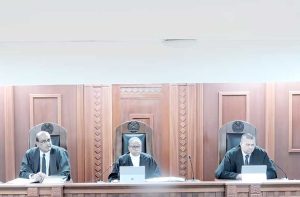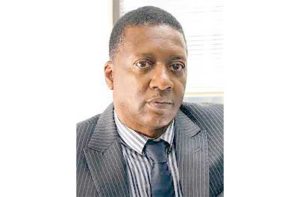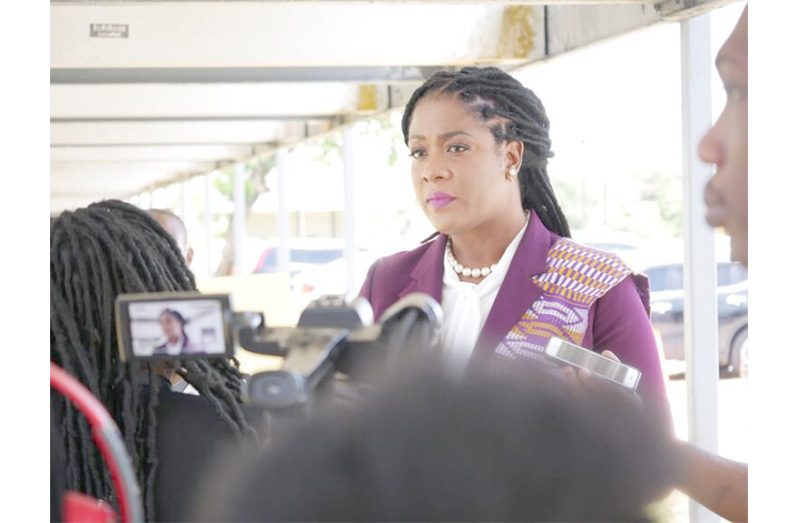–affirms GECOM acted lawfully in excluding FGM, ALP from ballots
The Court of Appeal on Thursday unanimously dismissed an appeal brought by Krystal Fisher, a candidate of the Forward Guyana Movement (FGM), against the Guyana Elections Commission (GECOM).
The appeal challenged the exclusion of her party from ballots in Regions Seven, Eight, and Nine in the recently concluded September 1, 2025, General and Regional Elections.

The FGM is a coalition of three distinct political entities: Forward Guyana (FG), The People’s Movement (TPM), and the Vigilant Political Action Committee (V-PAC).
FG is led by attorney-at-law Amanza Walton-Desir, TPM is headed by Apostle Nigel London and V-PAC is chaired by businessman Dorwain Bess.
Walton-Desir also serves as the overall leader of the FGM.
The decision was delivered by Acting Chancellor of the Judiciary, Justice Roxane George, SC, who made it clear that the court found “no merit” in Fisher’s claims and reaffirmed the interpretation of the Representation of the People Act (ROPA) and the Constitution of Guyana applied by Chief Justice (ag) Navindra Singh in the High Court in August.
Days before the elections, Fisher, an elector residing in Region Nine and a candidate on FGM’s national top-up list, had challenged GECOM’s omission of her party from the ballots in the three constituencies.
She argued that the exclusion violated her right to ballot access and free and fair elections, and that it amounted to unconstitutional discrimination.
The appellant sought several declarations, including that any election held without including all qualifying political parties on the ballot in all 10 regions was unconstitutional and void.

She further argued that political parties that meet the statutory minimum list requirements under ROPA should appear on every ballot paper, regardless of whether they had fielded candidates in a particular geographical constituency.
She also appealed the award of costs against her by the Chief Justice, which had ordered her to pay $1 million each to the respondents—the Attorney General and GECOM.
Justice George observed that Fisher’s affidavit failed to disclose that FGM had itself chosen not to contest in Regions Seven, Eight, and Nine, nor did it mention that another party she cited—the Assembly of Liberty and Prosperity (ALP), led by Simona Broomes—had also opted out of contesting in certain constituencies.
Her affidavit, the Chancellor pointed out, “conveyed the impression that GECOM unilaterally excluded the names of FGM and ALP from the ballots in these constituencies.
“It is only from the affidavit of defence filed on behalf of GECOM that this material set of facts emerged, that it was the choice of these parties not to contest these constituencies. This is a material non-disclosure on her part, which the court frowns on.”
She stressed that such a non-disclosure “could lead to the dismissal of a case, since she must have been aware of this information, particularly as a candidate for FGM.”
The Court of Appeal also addressed the issue of jurisdiction. Justice George explained, “This Court holds that the relief sought by the appellant amounts to a challenge to the validity of the elections. Such a challenge must be by way of election petition, pursuant to Article 163 of the Constitution.”
She emphasised that “this is not an appeal from an election petition, and as such, this court would have no jurisdiction to entertain it. In this regard, the Chief Justice sitting in the High Court would have had no jurisdiction to entertain the application.”
Nevertheless, the court opted to consider the merits of the case in the event its jurisdictional position was incorrect.
On the substantive issues, the Chancellor was firm that Fisher’s contentions reflected “an extremely flawed view of the constitutional and statutory provisions regarding the ability of parties to be allowed to, in effect, contest in geographical constituencies for which they have not submitted lists of candidates.”
The Court of Appeal agreed with the Chief Justice’s finding that “the application has no merit.”
Justice George stated, “The Court agrees that ballot access and therefore voting rights are limited to parties contesting the particular geographical constituency.”
She clarified that Articles 59 and 159 of the Constitution, which deal with the right to vote, were not violated.
“These provisions do not create a fundamental right to vote, but establish conditions which would permit a person to exercise their franchise,” she said.
Chancellor George firmly rejected claims of discrimination, stating, “GECOM did not deny the appellant ballot access as an elector, nor did it prevent her from contesting the election as a candidate for FGM. Similarly, it cannot be considered to be discrimination against an elector…if the political party of that elector’s choice decides not to contest the elections.”
She added that “it is not for GECOM to consider the racial makeup of a constituency in deciding to permit a party to be on the ballot for a constituency it chose not to contest.”
Justice George concluded that “there’s nothing in the provisions or the omission from the ballot that suggests discrimination in any form or fashion. It would be absurd to hold that one’s political party can choose not to participate in an election, and then one is permitted to cry foul, relying on Articles 13 and or 149.”
In explaining the electoral system, the Chancellor highlighted that the Representation of the People Act must be read together with Article 160 of the Constitution, which provides for both geographical constituencies and a national top-up list.
“A vote for a candidate in a geographical constituency is tied to the vote for a candidate from the national top-up list,” she explained. “The omission of FGM from the ballots for geographical constituency seven, eight and nine…is absolutely lawful. GECOM has complied fully with Article 160 and the provisions of ROPA, more especially sections 11A, 11B and 11C.”
Ultimately, the appeal was dismissed. Justice George concluded: “As a consequence, the appeal is dismissed. The Court considered that it should not interfere with the costs order imposed by the Chief Justice. The court finds that there is no valid reason to disturb the discretion. This case is most unmeritorious and has taken up significant judicial time.”
The Court of Appeal ordered Fisher to pay costs of $1 million to each respondent, and upheld the original High Court cost order, bringing the total to $4 million.
The court directed that the entire sum be paid by November 14, 2025.
In addition to the Chancellor, the panel also comprised Justices of Appeal Rishi Persaud and Nareshwar Harnanan.
Fisher was represented by Attorney Dr. Vivian Richards, while Attorney General Anil Nandlall, SC, appeared in person along with Deputy Solicitor General Shoshanna Lall and State Counsel Raeanna Clarke. GECOM’s legal team comprised Attorneys Arudranauth Gossai and Anthony Asthaphan, SC.



.jpg)






